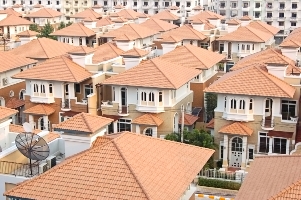
A gated middle-class community in Bangkok, Thailand. (Getty)
Over the past two decades, Bangkok has experienced multiple shocks—the Asian financial crisis of the late 1990s started in Thailand; in 2011, the country was hit by a devastating flood that displaced more than 1.5 million people; and in May of this year, the country experienced its twelfth coup d’état in less than a century.
Yet building resilience in Bangkok, a bustling and densely-populated city of over six million people, “is not just about recovery from shocks, or going back to the original state of being,” said Apiwat Ratanawaraha, an urban planning expert in Bangkok. “It’s about transformation from a bad state into a better state.”
Urbanization has become a central issue in global development and security, as experts project that by 2030, more than three quarters of the world’s population will live in cities. Fast urbanization can offer higher standards of living, but it comes at a cost—local institutions may be unable to scale-up their infrastructure to accommodate rapidly growing populations, and the resulting failures can turn cities into havens for violence, crime, and poverty.
Experts suggest that the majority of this population growth will be in impoverished city neighborhoods, with the global population of city slums reaching two billion people as soon as 2030. Bangkok’s Klong Toey slums, for instance, are home to over 100,000 people and ostensibly function as a hub for the city’s criminal gangs.
The Global Observatory spoke with Mr. Ratanawaraha, Lecturer at the Department of Urban and Regional Planning of Chulalongkorn University, about the meaning of urban resilience and how fast urbanization is affecting Bangkok.
The interview was conducted by Andrea Ó Súilleabháin, Policy Analyst at the International Peace Institute (IPI). Mr. Ratanawaraha’s case study on urban stress and resilience in Bangkok will be published in a forthcoming report as part of IPI’s project “Cities Under Stress: Building Urban Resilience.”
In terms of urban planning, what is the most important source of stress in Bangkok?
The most important source of stress is the increase in “club goods.” What I mean by club goods are things like gated communities, private schools, private security services. These are problematic because they add to the stress of providing public services. A lot of gated communities in Thailand provide their own services, so the people who live there are the middle class and the rich. And they are not going to be helping the general public or the city to provide public goods to other people. This, in turn, will affect social cohesion and the ability to increase collective action to create better services and build resilience.
Social media is big in Thailand. How does it contribute to this stress?
People are not only segregated physically by living in gated communities and condominiums, they are also segregated virtually because they have their own Facebook pages, they just talk to people who are their friends. A lot of people are connected digitally—Thai people love Facebook and Twitter. But they don’t have interactions with other people outside their Facebook “clubs.” So it creates this “information cocoon” where you just talk to people who share similarities in terms of background, political beliefs, and hobbies. You don’t see interaction across social groups, which in turn makes social cohesion even more difficult to build.
Are there other key obstacles to building resilience in Bangkok?
One problem that I think will make it difficult to build resilience, especially collective resilience across social groups, is that a lot of people live in the city without political representation. There is this law that requires that you have some sort of property or be associated with somebody who owns property in order to get household registration. Without household registration, you are not going to be able to vote. This creates a problem of residence without representation, which in turn affects the ability for people to participate politically and even feel ownership that they can invest in the city. A lot of rural people who migrated to Bangkok don’t have that political representation, so they are kind of in a limbo. They live in Bangkok but they don’t exactly have citizenship there.
How do you define urban resilience?
Resilience is not just about recovery from shocks, or going back to the original state of being. It’s about transformation from a bad state into a better state. For example, resilience after a flood in terms of housing doesn’t mean that you build exactly the same types of houses as you did before. Rather, in terms of transformation, resilience in housing means that you are adopting something more sustainable, something better. That’s resilience.




